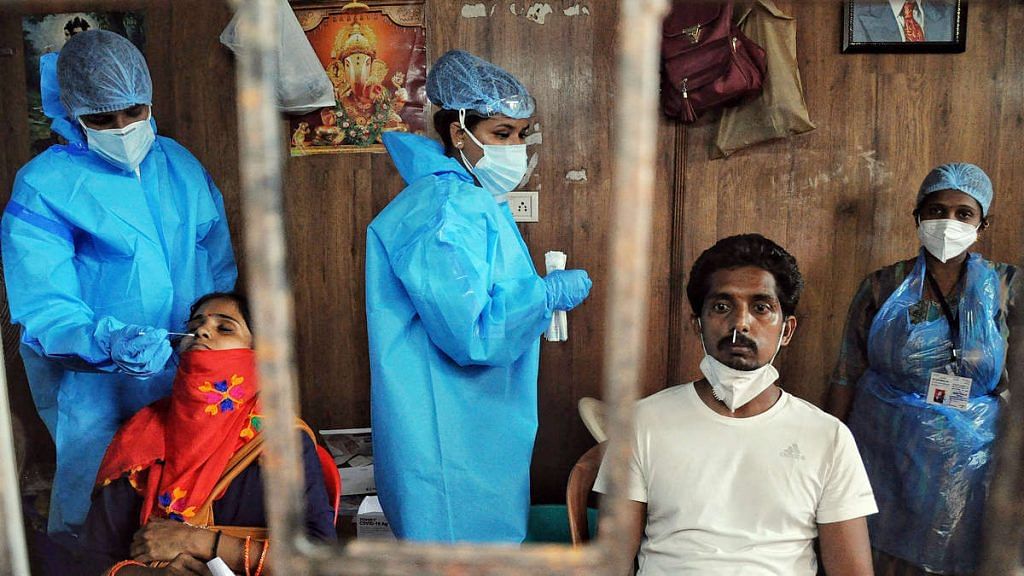New Delhi: As winter approaches, the Ministry of Health and Family Welfare (MoHFW) has released guidelines for the management of co-infections of Covid-19 with other seasonal diseases like dengue, malaria, seasonal influenza (H1N1), leptospirosis and chikungunya, among others.
The ministry said Tuesday that these diseases not only pose clinical challenges for Covid diagnosis, but also have a bearing on patient outcomes, as they mimic its symptoms.
As of 13 October, India has recorded a total of 71,75,880 Covid-19 cases with 1,09,856 deaths and 62,27,295 recoveries.
Also read: Covid-dengue ‘co-infections’ are Bengal’s new challenge as doctors say treatment very tricky
Testing procedures
According to the health ministry guidelines, a “high index of suspicion” should be maintained for these diseases in both pre- and post-monsoon seasons.
“Alert vigil, a high index of suspicion and constant awareness of the possibility of co-infections can help physicians avert the adverse outcome of cases with co-infection and improve clinical outcomes,” it stated.
For this, the guidelines say while Covid testing procedures will remain the same, further tests for a likely co-infection are to be undertaken if suspected.
In the case of co-infections, cross-reactions i.e. false negatives or positives may arise. The guidelines therefore suggest that confirmatory tests be undertaken for possible co-infections in the case of each of these seasonal diseases.
The tests include those specified by the Indian Council of Medical Research (ICMR) for Covid diagnosis, the National Vector Borne Disease Control Programme (NVBDCP) (for malaria, dengue, chikungunya) and National Centre for Disease Control (NCDC) (for seasonal influenza, leptospirosis and scrub typhus).
“(Covid) testing protocol as per MoHFW/ICMR guidelines will be followed. However, in addition, further tests for a likely co-infection will also be undertaken, whenever suspected,” the ministry’s statement said.
The guidelines also ask Covid treatment facilities to ensure rapid diagnostic kits for malaria, dengue and scrub typhus. Physicians are also advised to suspect bacterial infection in moderate or severe cases of Covid that are not responding to treatment.
Clinical management and prevention of co-infections
The guidelines state that all secondary and tertiary hospitals should be prepared to manage severe dengue and Covid cases. Mild to moderate dengue and Covid co-infected patients should be monitored closely, preferably at hospital, as they may rapidly progress to severe stage.
The health ministry said: “Malaria/dengue can coexist with other infections, and thus confirmation of malaria/dengue infection does not rule out the possibility of the patient not suffering from Covid-19. Similarly, a high index of suspicion of malaria/dengue must be there when a fever case is diagnosed as Covid-19, particularly during the rainy and post rainy season in areas endemic for these diseases.”
In case of seasonal influenza and Covid co-infection, all influenza-like illness (ILI) or Severe Acute Respiratory Illnesses (SARI) cases in areas reporting Covid-19 cases must be tested for both Covid-19 and seasonal influenza.
In areas where leptospirosis is known to cause outbreaks during the monsoon and after it, the possibility of co-infection should be considered, as it has the tendency to manifest as acute respiratory illness.
The guidelines also suggest preventive measures to avoid co-infections. These include integrated surveillance by the Integrated Disease Surveillance Programme. Basic preventive measures like avoiding large gatherings, social distancing and hand hygiene need to be maintained. In addition, reduction of mosquito-breeding sites, especially around health facilities, needs to be ensured, along with aggressive vaccination for seasonal influenza for healthcare workers and other high-risk groups.
Also read: Andhra villages see big drop in dengue, malaria, typhoid cases after pilot sanitation drive
